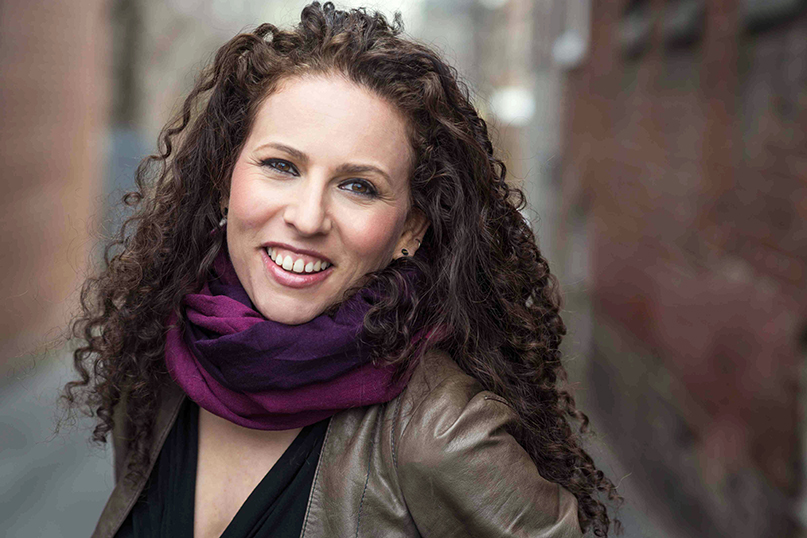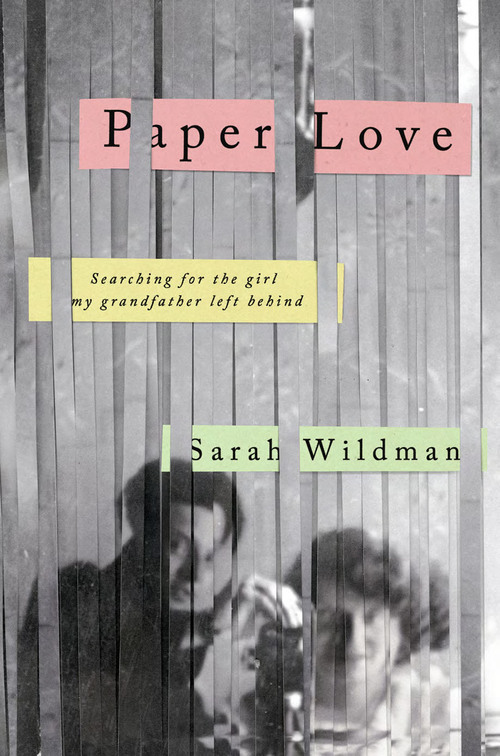
Journalist embarks on a journey to learn the fate of her grandfather’s lost love during the Holocaust
By Stacey Dresner

Journalist and author Sarah Wildman will discuss her new book, Paper Love: Searching for the girl my grandfather left behind,” on Zoom, Tuesday, July 12 in an evening hosted by Voices of Hope, an organization comprised of the children and grandchildren of Holocaust survivors that is dedicated to furthering Holocaust education.
Wildman tells the story of her grandfather, who left behind the woman he loved when he escaped from Vienna in 1938. He eventually settled in Pittsfield, Massachusetts, where he practiced medicine for more than 40 years. The discovery of the woman’s existence sent Wildman on a journey to learn of the young woman’s fate.
Wildman is working on turning Paper Love into a feature film, with the help of a grant from the Jewish Writer’s Initiative.
She recently spoke to the Jewish Ledger about her book and how she researched her grandfather’s remarkable story.
JEWISH LEDGER: How did you find out about the relationship your grandfather had in Europe before the war?
SARAH WILDMAN: I was in my grandparents’ house in Northwest Massachusetts in the Berkshires. And I was kind of rooting around in an old cabinet and came across an old album, the kind with photo corners and block pages with images that were clearly from Europe. And in that book were photos of my then-very young grandfather and his sister and other family members. A small note fell out of the album – the note had four quadrants and each quadrant had an image of this woman, and under each was a caption… things like, “no call today? Maybe tomorrow, surely tomorrow there will be a letter.”
I showed it to my grandmother and she sort of dryly and inexplicably said, ‘It was your grandfather’s true love,” and left the room. I didn’t quite know what to do with that. My grandfather was no longer living at the time, so I called his sister Cilli.
Cilli said the woman’s name was Valerie Scheftel – Valy – and she had come alone to study medicine at the University of Vienna where my grandfather was a medical student in the early 1930s in what was then Czechoslovakia. She had fallen in love with him immediately, apparently, and he had sort of ignored her. Then one summer he realized he loved her too and raced to tell her and they had this whirlwind romance. As they watched what was happening in Germany, they planned to escape together. Instead, he escaped with my great-grandmother and his sister, his five-year-old nephew, and his brother-in-law.
Cilli then wrote me a letter and said, essentially, ‘I’ve always wondered what happened to Valy – maybe you’re the one to tell her story.’ And at the time, I thought, well, how would I even do that? I was only a few years out of college at the time I first found out about Valy, and I thought, how would I go about finding this one person who didn’t have a digital footprint of any kind – where would you start? Even so, it changed what I understood of my family’s story. Of course my grandfather had not escaped with everyone – how could he?
At first, I didn’t think I could find Valy. But in my journalism work, I began writing more and more stories about the Holocaust that broadened my understanding of the period. I kept wondering who were the regular people? People like me. What happened to them?
Then, after a couple of years had passed – my grandmother had died at this point – I came across an old file box among my grandfather’s papers. It was labeled “Patient Correspondence A-G.” I went through it one night and realized the box was mislabeled: Inside were hundreds and hundreds of letters from my grandfather’s entire exploded Viennese world. And there were dozens and dozens of letters from this woman, Valy.
Tell us about your grandfather, Karl Wildman?
My grandfather Karl was born in the town of Zaleszczyki, in the Austro-Hungarian empire but came as a toddler – at just about two years old – to Vienna. He was a part of the wave of what they called “Ostjuden” – Eastern European Jews who flooded in from all parts of the empire during the First World War. He and his family settled in the second district of Vienna.
He was always known in my family as incredibly clever, and insatiably curious. He was also magnetic – the kind of person everyone loved to be around. Even today, many years after his death, I still run into people who knew and loved him.
Did he finish medical school in Vienna or when he arrived in the U.S.?
He was very fortunate in that he finished medical school in Vienna. But when he arrived in the United States it was a time of aggressive lobbying against Jewish refugee physicians. Karl was helped by a group called the National Committee for the Resettlement of Foreign Physicians. That was how he ended up in the far northwest corner of Massachusetts, as they tried to help settle Jews and helped set them up with some grants because most of them were penniless.
The archives of that group are held at the University of Minnesota. Remarkably, they had dozens of pages of correspondence with my grandfather – he first wrote from Vienna, then continued to write to them through the time he settled in Massachusetts. The notes showed that the family was incredibly impoverished when they arrived, and for more than a year after they got here. The family had sold his mother’s jewelry and they existed on very little money. Once he found safe haven, my grandfather was also being written to by relatives and friends stuck in Europe asking him for help – for money, for tickets – but he was barely surviving. It was surely terribly hard to know he could do so little.
When the United States entered the war, Karl enlisted in the U.S. Army. He was sent to the Pacific, where he served in a M.A.S.H. unit. While he was there, he did research on malaria. For that work he won a big award, was brought back to the U.S. to lecture on his findings, and eventually left the service after being promoted to the rank of Major. Before he deployed he married my grandmother, who was from Pittsfield.
What led you to write about the letters you found?
Around the same time that I found Valy’s letters, I started hearing about the International Tracing Service Archives in Bad Arolsen, Germany. They were among the last closed Holocaust archives. I wondered: what If I could go with the first group of scholars when they open it and investigate what’s inside?
At first, I set out to write a series of stories for Slate about the archives, and Valy. I wanted to be able to tell the story of the archives, by understanding how to search for a single person there, and what I could find about her. I was curious what I’d find. It wasn’t clear at the outset.
Now they’ve been digitized but at the time, they weren’t. When I arrived, almost everything was just paper and cardboard boxes. It was a bit like the last scene of “Raiders of the Lost Ark” – miles and miles of boxes and files. This is what the book was born out of, which was originally looking at these archives.
What did you find in the archives?
In Bad Arolsen, I asked if they had what was called a “Tracing and Documentation” file for Valy. That meant a file created when an individual was searched for. Amazingly, they did have one. But it hadn’t been my grandfather who had come looking for her. In other words the information was tantalizing, but unclear. So while I considered what to do to find that searcher, I decided to first retrace Valy’s steps.
In the letters she wrote to my grandfather, I saw she ended up leaving Vienna and returning to her town in Czechoslovakia, which was, in mid 1938, still free. The Munich agreement changed that. After the Sudetenland became part of the Reich her town became too antisemitic to stay. She ended up going into Berlin to look for work. It was 1939. She continued to write my grandfather, from there, desperately asking him for help through 1941 – first for herself, and then for herself and her mother.
I retraced her steps. I went to all the places that she went to try and figure out where she had gone, how she had lived, and what she went through.
I followed her steps until the U.S. entered the war when her letters were cut off. And at that point, I thought, I don’t know where to go from here. One of my colleagues said, ‘Why don’t you look for the woman who searched for her?’ The results of that search changed my whole trajectory of understanding what happened to Valy. But for that you’ll have to read Paper Love.
What were you doing at that time that you began working on this project?
I received grants to work on a five-part series of stories for Slate on the last Holocaust archives. I was an Arthur F. Burns Fellow in Germany and also was an American Council on Germany Fellow. With those grants, I went with the first group of scholars from the U.S. Holocaust Memorial Museum that was organized to see the archives at Bad Arolsen when they began to open. Then I stayed on in Germany to continue the search. My work also took me to Vienna, Czechoslovakia, Israel, and London.
How did trying to find your grandfather’s “true love” affect the way you saw your grandparents’ relationship?
I think “true love” represented everything that had happened before he was forced to flee. It was the life he’d lived, the people he’d known, the world he was from. In some ways, she was a representative of that lost world.
And yet, despite that – my grandfather lived with a tremendous amount of joy. He loved Vienna and went back again and again…starting in 1950, to search for those who remained. And also because, I think, he refused to let them take his Vienna from him.
I pursued this because I was drawn to better understanding the totality of my grandfather’s story – and therefore my own. What does it mean to carry this legacy, to know these people, to be the bearers of their stories? How can we continue to tell their stories, as we lose witnesses?
Valy was this incredibly modern woman, an intellectual, one we wouldn’t know if my grandfather hadn’t preserved her words and maintained the dignity of her individuality. Her words became my witness in Paper Love.
“A Conversation with Sarah Wildman” will be held on July 12 at 7 p.m. over Zoom. The program is free and open to the public. To register, visit https://voices-of-hope-inc.networkforgood.com/events/30568-an-evening-with-sarah-wildman or Voices of Hope’s Facebook page or website www.ctvoicesofhope.org.








 Southern New England Jewish Ledger
Southern New England Jewish Ledger









